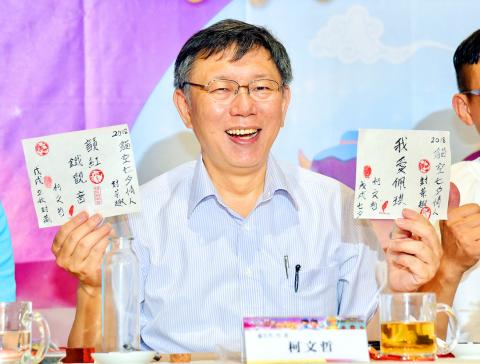Taipei Mayor Ko Wen-je (柯文哲) yesterday said that his discourse on cross-strait relations has always been clear and his statement that “the two sides of the [Taiwan] Strait are one family” remains his fundamental stance.
Wu Tsu-chia (吳子嘉), a commentator who runs news Web site my-formosa.com, on Saturday said that Ko’s discourse on cross-strait relations has been vacillating and lacks a “fundamental spirit.”
When asked by reporters to comment on Wu’s remarks, Ko said: “My attitude toward cross-strait relations is very certain.”

Photo: Huang Yao-cheng, Taipei Times
Many have criticized him for meeting with politicians from different camps, and he used to wonder why, but he has now reached an answer, Ko said.
“I worked at intensive care units and emergency rooms as a doctor, and doctors have a trait: We never get to choose our patients,” Ko said. “We cannot ask patients to come in only if they are affiliated with the Chinese Nationalist Party [KMT] or Democratic Progressive Party.”
He has no difficulty speaking with politicians from the pan-blue or the pan-green camps, Ko said, adding that having “practical dialogues” is his specialty, because his experience as a surgeon has made him practical and willing to listen to different opinions.
“The statement that ‘the two sides of the [Taiwan] Strait are one family’ is still a fundamental element [of my cross-strait discourse] for the time being. It does not pertain to politics, but rather to cultural and economic exchanges, as well as exchanges between private actors and between cities,” he said.
“The nation’s future cannot rely on others’ friendliness toward us, so economic capability and national defense must be bolstered while expressing our friendliness,” Ko said.
“I do not advocate the two sides of the Strait talking tough to each other and causing relations to become more tense, which is what we see now and I do not think that is a good situation,” he added.
Separately yesterday, Ko presented two new spokespeople for his campaign office for the Nov. 24 nine-in-one local elections.
Tsai Chun-wei (蔡峻維) and Yang Sheng (楊笙) are both in their 20s and were chosen through an open audition, Ko said.
Tsai and Yang are to first work as interns alongside office spokesman Lin Hsiao-chi (林筱淇) and Taipei Mayoral Office spokesman Lin Kun-feng (林昆鋒), who is to leave his post and join the campaign team as head spokesman next month, the office said.

Taiwan would welcome the return of Honduras as a diplomatic ally if its next president decides to make such a move, Minister of Foreign Affairs Lin Chia-lung (林佳龍) said yesterday. “Of course, we would welcome Honduras if they want to restore diplomatic ties with Taiwan after their elections,” Lin said at a meeting of the legislature’s Foreign Affairs and National Defense Committee, when asked to comment on statements made by two of the three Honduran presidential candidates during the presidential campaign in the Central American country. Taiwan is paying close attention to the region as a whole in the wake of a

Chinese Nationalist Party (KMT) Chairman Eric Chu (朱立倫), spokeswoman Yang Chih-yu (楊智伃) and Legislator Hsieh Lung-chieh (謝龍介) would be summoned by police for questioning for leading an illegal assembly on Thursday evening last week, Minister of the Interior Liu Shyh-fang (劉世芳) said today. The three KMT officials led an assembly outside the Taipei City Prosecutors’ Office, a restricted area where public assembly is not allowed, protesting the questioning of several KMT staff and searches of KMT headquarters and offices in a recall petition forgery case. Chu, Yang and Hsieh are all suspected of contravening the Assembly and Parade Act (集會遊行法) by holding

President William Lai (賴清德) has appointed former vice president Chen Chien-jen (陳建仁) to attend the late Pope Francis’ funeral at the Vatican City on Saturday on his behalf, the Ministry of Foreign Affairs said today. The Holy See announced Francis’ funeral would take place on Saturday at 10am in St Peter’s Square. The ministry expressed condolences over Francis’ passing and said that Chen would represent Taiwan at the funeral and offer condolences in person. Taiwan and the Vatican have a long-standing and close diplomatic relationship, the ministry said. Both sides agreed to have Chen represent Taiwan at the funeral, given his Catholic identity and

PRAISE: Japanese visitor Takashi Kubota said the Taiwanese temple architecture images showcased in the AI Art Gallery were the most impressive displays he saw Taiwan does not have an official pavilion at the World Expo in Osaka, Japan, because of its diplomatic predicament, but the government-backed Tech World pavilion is drawing interest with its unique recreations of works by Taiwanese artists. The pavilion features an artificial intelligence (AI)-based art gallery showcasing works of famous Taiwanese artists from the Japanese colonial period using innovative technologies. Among its main simulated displays are Eastern gouache paintings by Chen Chin (陳進), Lin Yu-shan (林玉山) and Kuo Hsueh-hu (郭雪湖), who were the three young Taiwanese painters selected for the East Asian Painting exhibition in 1927. Gouache is a water-based